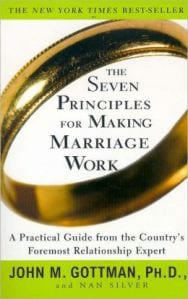Living in Reverse Series: Conflict Resolution & Fighting Fair

[vc_row][vc_column][vc_column_text]Do you know how to fight fair? Many therapists will tell you that you need to resolve conflict without fighting. I, on the other hand, believe strongly in the researched methods of Dr. John Gottman. According to Gottman, the problem is not the fight, but how you fight. Without fail, we resort to what we know. What we know comes from what we learned growing up from our friends, family, and other authority figures. What is your fighting style? Do you cuss, yell, and name call? What about shutting down and completely ignoring the other person? How about throwing things or kicking holes in the wall? Do you meet challenges with manipulation and guilt trips?
I love the work and research of Dr. John Gottman. If you have not read any of his books, I highly recommend them. He has spent the past several decades researching the dynamics of couples and has identified unhealthy fighting styles, which he calls the Four Horsemen. The Four Horsemen are criticism, contempt, defensiveness, and stonewalling.
Criticism is when we verbally assault someone’s character or personality. Attacking someone verbally on a personal level to win an argument is hurtful and abusive. Yet criticism happens so often in disagreements. What does criticism look like? It is negative, accusatory, blaming, finger pointing, and assassinating character.
Dr. Gottman calls contempt the worst of all the four horsemen. Contempt conveys disgust for the other person and is very poisonous to the relationship. What does contempt look like? It is sarcastic, sneering, cynicism, name calling, eye rolling, mocking, condescending, joking in a hostile way, maybe even belligerent. A contemptuous person comes into the argument with guns blazing, ready to plow you over and demean you as quickly as possible. Someone full of contempt has no desire to fix the problem or reconcile, but rather to dress you down and show you who the boss is. Contempt is meant to make you feel small, weak, and insignificant.
Defensiveness, according to Dr. Gottman’s research, rarely has the desired effect in an argument. In a fight, especially with someone who is contemptuous, defensiveness just fuels the fire. It gives the impression that you are not the problem, since you are defending yourself, which makes the other person feel blamed. Defensiveness does not provoke apologies or backing down, but rather escalates the conflict.
Stonewalling is tuning out or disengaging from the other person or the discussion. Stonewalling is not quietly listening, but rather communicates that you are no longer listening. A stonewaller will look away or down without responding in any way. They act like they do not care about anything you are saying. Arguing with a stonewaller can be infuriating in that the less they appear to listen, the more the other person will yell to be heard. The more the yelling escalates, the less responsive the stonewaller gets, which leads to a never ending cycle of fighting.
Now that we have identified the Four Horsemen, how do you fight fair? Here are some of the qualities of a fair fight:
- Complaints are about the other person’s actions, not about them as a person.
- Enter the argument gently by simply saying what you need to say without being harsh or abrupt.
- If you can tell that your breathing or heart rate are too fast, take a break to calm your body down, then come back to the argument. Dr. Gottman calls this flooding. When we are flooded we are feeling overwhelmed emotionally and our thinking and ability to communicate gets clouded.
- If the other person gives a piece offering, some humor to lighten the mood, or in any way tries to repair the relationship ACCEPT IT! Do not reject repair attempts or dismiss them.
- Try and think the best of the other person. If you automatically think the worst, your words will come out with contempt, criticism or defensiveness.
I will end with a quote directly from Dr. Gottman. He says, “The key to reviving or divorce-proofing a relationship is not in how you handle disagreements, but in how you are with each other when you’re not fighting.” In other words, the most important thing in a relationship is a friendship. The quality of the friendship will influence the quality of the arguments. If you have a great friendship, then you will have mutual respect for one another and will honor that friendship even in an argument. Friendship is the true foundation of any healthy relationship.

Gottman, J., & Silver, N. (1999). The Seven Principles for Making Marriage Work. New York: Crown.[/vc_column_text][/vc_column][/vc_row][vc_row][vc_column][vc_column_text][easy-social-share buttons=”facebook,twitter,google,pinterest,tumblr,print,mail” counters=”0″ counter_pos=”left” total_counter_pos=”left” hide_names=”no” fullwidth=”” fixedwidth=”” sidebar=”” sidebar_pos=”left” popup=”” float=”” template=”metro-retina”][/vc_column_text][/vc_column][/vc_row][vc_row][vc_column][vc_separator][/vc_column][/vc_row][vc_row][vc_column][vc_basic_grid post_type=”post” max_items=”3″ orderby=”rand” item=”76259″ grid_id=”vc_gid:1441325935406-0f22f81a-7b1a-10″][/vc_column][/vc_row]

Responses